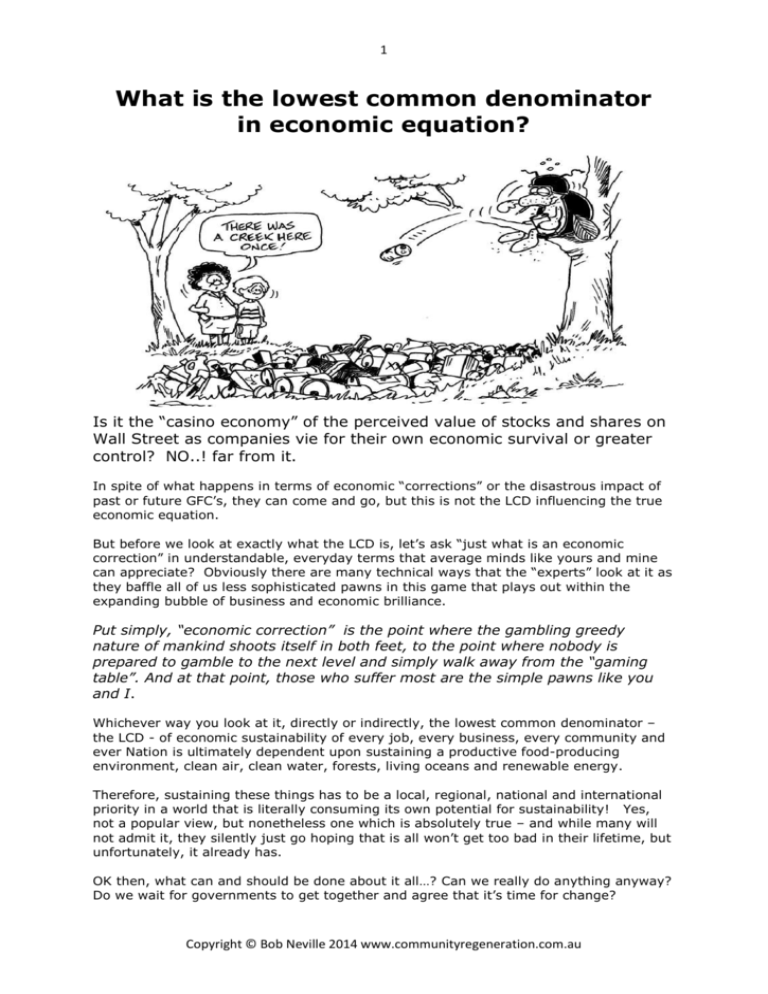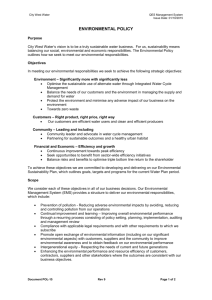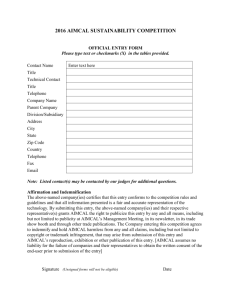Lowest Common Denominator
advertisement

1 What is the lowest common denominator in economic equation? Is it the “casino economy” of the perceived value of stocks and shares on Wall Street as companies vie for their own economic survival or greater control? NO..! far from it. In spite of what happens in terms of economic “corrections” or the disastrous impact of past or future GFC’s, they can come and go, but this is not the LCD influencing the true economic equation. But before we look at exactly what the LCD is, let’s ask “just what is an economic correction” in understandable, everyday terms that average minds like yours and mine can appreciate? Obviously there are many technical ways that the “experts” look at it as they baffle all of us less sophisticated pawns in this game that plays out within the expanding bubble of business and economic brilliance. Put simply, “economic correction” is the point where the gambling greedy nature of mankind shoots itself in both feet, to the point where nobody is prepared to gamble to the next level and simply walk away from the “gaming table”. And at that point, those who suffer most are the simple pawns like you and I. Whichever way you look at it, directly or indirectly, the lowest common denominator – the LCD - of economic sustainability of every job, every business, every community and ever Nation is ultimately dependent upon sustaining a productive food-producing environment, clean air, clean water, forests, living oceans and renewable energy. Therefore, sustaining these things has to be a local, regional, national and international priority in a world that is literally consuming its own potential for sustainability! Yes, not a popular view, but nonetheless one which is absolutely true – and while many will not admit it, they silently just go hoping that is all won’t get too bad in their lifetime, but unfortunately, it already has. OK then, what can and should be done about it all…? Can we really do anything anyway? Do we wait for governments to get together and agree that it’s time for change? Copyright © Bob Neville 2014 www.communityregeneration.com.au 2 Well, certainly this needs to happen and while we see some signs of progress (due only to the fact that some governments realise now that something must be done) there is a long way to go and a lot to happen first. All of this is hamstrung along the way by childish attitudes of “well we are not going to do it until you do it first” while at the same time guarding their own short-term economic interest above that of overall (short, medium and long term) sustainability. Yes, governments need to get their backsides into line before all of the chairs fall over, but this is only part of the solution. Change has to occur on many levels, but unfortunately, governments tend to see the challenges from a macro-perspective often failing to comprehend the impact of and on the micro-perspective. The lowest common denominator in terms of “action” on sustainability comes down to the individual, the family and the community at the micro/community level and progressively, regional and national organisations, business and government. Wait a minute…well that includes “everyone”..! Yes, it sure does. We all have a direct responsibility when it comes to sustaining the economic equation, and like it or not, the economic equation cannot be separated from environmental sustainability – the two are essentially inseparable. This outlook has not been a priority in the past, but now is paramount to survival. Yes, economic sustainability depends on environmental sustainability and to address both of these requires individual and collective change. But change of what? I hear you say: “I can’t change this mess – governments and big business are responsible – they created it.” Well certainly they have had a big hand in creating, facilitating or allowing the mess, but we can’t blame them exclusively – we are all involved in many ways towards creating and sustaining the problem, usually by the way we use and abuse the very products which these businesses provide to us every day. The change that is required is one of “attitude” and that won’t happen until or unless each of us individually recognize the need to change our own economic and environmental attitude to one of sustainability in our own individual patch – in our own backyard – and essentially NOW, rather than when it becomes far, far too late. It is not hard to see the need for change – you only have to look around you. But change is a personal matter, not only must we see the need for change, we must be selfmotivated enough to do something about it – again starting right in our own backyard. Something as simple as litter, or waste, or being dumb enough to get caught up in the treadmill of “junk” merchandising. This includes corporate marketing of junk food and drink, having to trade in on all the latest gadgets and technology just to keep up with others, and endless volumes of “cheap junk” that you buy and throw away, made in factories overseas from raw materials scooped from the very ground you stand on. Our bargain-hungry consumer society is consuming itself and using the illusion of credit to pretend that it can have everything it wants now and that it won’t matter tomorrow. This is crazy, as virtually all the consumer-tech gadgets you buy in this realm are totally obsolete even before they hit the market – the next model is already set up for production. Copyright © Bob Neville 2014 www.communityregeneration.com.au 3 Change starts with education – the right kind of education, based on the realisation that we live in a very finite world and we are consuming, polluting and destroying it at an unsustainable rate. Do you really believe that all of those Corporations out there that market all this stuff really care about sustainability? The massive over-use and waste of resources that results – they will tell you is not their responsibility – it is yours. Well they are partly right but they won’t change because they are only driven by the obsession of sustaining their own existence. If they stop or slow down they die. If you stop falling for their marketing madness, then they also die. The greatest human power on the planet is that of individual choice and if you have the courage to step back and look at what is really going on and decide that you will no longer be conned by marketing muck, then you have made a valuable start. Education starts with our children, in the home and teaching them real values, but this understanding is worthless if you as a parent do not get the message and do not care. By the time they reach the age of twelve or fifteen, it is probably too late. Our kids must be taught, from a very early age, what really matters in life, true values, sustainability, the importance of positive relationships, trust and so on. In other words, the spirit of giving rather than that of “getting.” Starting with kids, debt and sustainability, here is a good article to read to them regularly. Beyond this, it is also up to you, your family and your community to recognise the need for change and do something about it for your community. Renewal of thinking and resultant change also needs to be part of small/micro business thinking. After all, this sector represents at least 84 percent of all businesses by number, and surely their sustainability footprint has a very significant impact. A new Industry (Small Community Regeneration) is now emerging and this is something that your community can take on board and have a real micro-level process for effective community regeneration and a sustainable outlook. The facilitative process of this Industry also assists those with new business ideas to consider the social and environmental impact of their ideas, as well as the economic impact. It provides communities with a practical, community-driven platform for community change. Have the courage to look into it and come on board. www.communityregeneration.com.au The Pathway to Small Community Regeneration Copyright © Bob Neville 2014 www.communityregeneration.com.au








